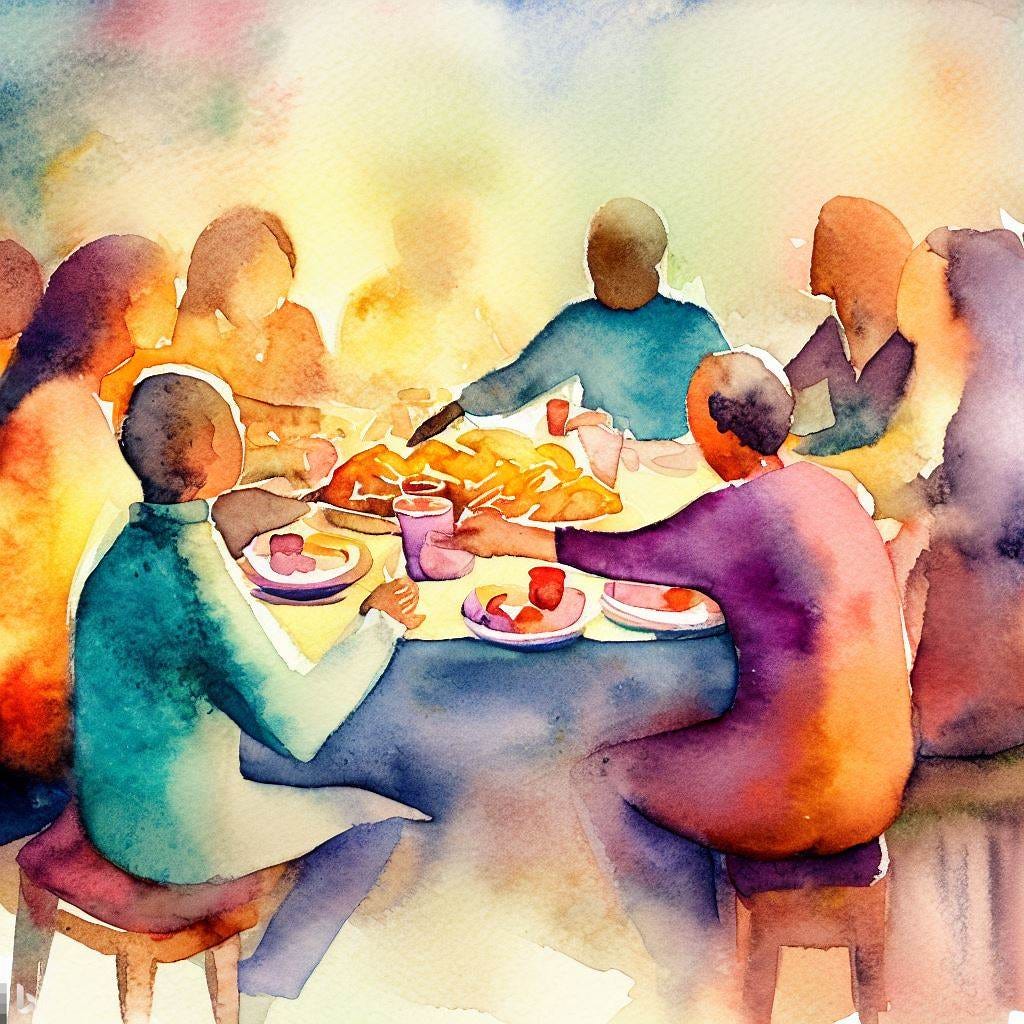Do your relationships lack meaning? Do you stick to surface-level conversations, or prefer texting and hiding your true self? Many of us interact superficially, avoiding vulnerability out of fear of judgment or rejection. But this leaves an emptiness inside. It seems to me, that humans have an innate longing for authentic connection at odds with our 21st Century lifestyle. There’s no product or profit in it… so it doesn’t get much attention, but developing your ability to create close bonds could profoundly enrich your life.
Following my recent articles on Reclaiming Conversations and moving From anxious isolation to relaxed connection, this guide will try to provide a step-by-step path to transform shallow interactions into meaningful relationships. By following these practical steps, you'll learn to engage with others more deeply. You'll build trust, share intimacy, and form lasting bonds that sustain you through life's ups and downs. The rewards of being fully seen and known are immense.
Here is the potential this journey holds:
End the loneliness of hiding behind a facade to discover the joy of being accepted completely
Trade surface-level politeness for open, honest relationships
Gain support you can count on during difficult times
Unlock deeper fulfillment, purpose and belonging
Have people in your life who bring out your best self
If you yearn for greater closeness, understanding, and mutual growth in your relationships, read on. The effort will enrich your life beyond measure.
Phase 1: Know Yourself
Start by self-reflecting. Consider how you currently relate to people. Are you fully open or do you hold back parts of yourself? When conflicts arise, do you withdraw or engage? Make an effort to understand your patterns. This book helped me enormously, to understand myself, other people and how to relax in the world :
The Four Agreements by don Miguel Ruiz
Once I understood that everyone is doing the best they can in tough circumstances, I could feel a lot more kindness, curiosity for other perspectives without judgement which led naturally to compassion, and unlocked my desire to create a positive difference in the world by helping people to get what they want.
For example: Journal about your tendencies in relationships, identify areas for improvement, discuss with a trusted friend. Follow the previous articles to start conversations in person, if you can’t get out of the house, use voice notes and face-time beyond texting.
Phase 2: Be Vulnerable
Practice vulnerability. Share honest thoughts, feelings, and experiences. Admit mistakes and ask for help when needed. It may feel risky but brings you closer together. Listen with empathy when others reveal themselves too. When you let go of trying to control what people think, or appearing strong and invincible then you can start being strong by being vulnerable.
Brené Brown is a very good author on the power of vulnerability - there’s a video of her discussing this idea on YouTube and she has a great book… The Power of Vulnerability. Ironically, she explains why this kind of ‘how to guide’ is not enough, we need to feel good enough to show ourselves, and learn by doing.
For example: Open up about your doubts on a first date, be honest about your mistakes at work, ask a friend for support when you're struggling
Phase 3: Address Conflict
This is something I’ve struggled with over the years, I hate confrontations, especially with close and important people to me - I’ve seen horrible family dynamics which make me very anxious of rejection.
Conflicts and disagreements are inevitable in relationships. Lots of people naturally avoid addressing issues head-on and instead bury frustrations, which damages bonds. We need to learn to engage with conflicts directly while maintaining mutual understanding and respect.
Ideally, when faced with a difficulty, don't accuse or attack the other person. Focus on how their actions impact you using "I" statements. For example, "I feel hurt when you cancel our plans last minute." Ask clarifying questions to fully understand their perspective. Look for valid points in what they say.
Take responsibility for your contribution to the problem. Sincerely apologize for your mistakes and remain open to feedback about your role. "I'm sorry I didn't consult you before booking that trip." "You're right, I should have been more considerate of your needs."
Compromise when you can find middle ground. Sometimes agreeing to disagree is okay too. The goal is resolving the conflict, not winning the argument. Avoid seeing it as a zero-sum game.
Don't make character judgments. Critique behaviors, not the person. "I get frustrated when you don't text back all day" not "You're so inconsiderate." Comment on how they affect you, not their motivations.
Stay engaged throughout the process. Even if emotions run high, don't withdraw or shut down. Silent treatments are destructive. Keep communicating and see it through.
Approaching conflicts openly and cooperatively will strengthen your bond. You'll gain understanding and feel closer once you work through disagreements. With practice, you can make conflicts constructive experiences.
Examples:
Calmly discuss an argument focusing on "I feel..." statements
Apologize taking responsibility for the part you played
Compromise to find a resolution you both feel good about
You may be unfortunate enough to ask, how do I connect with a partner who is accusing, attacking, not taking responsibility for their contributions to the problem, not acknowledging any fault, not interested in my perspective, condemning my character, painting my motivations in a way to cause deep hurt, as they are the opposite of my true self? Alright Johnny Depp, I’ve got some tips for you.
For dealing with a partner who engages in unconstructive conflict behaviors:
Don't retaliate or respond in kind. As hard as it is, avoid accusatory language, character attacks, and judgments about their motivations.
Use "I feel" statements to refocus the discussion on how their actions affect you. For example: "I feel very hurt when you say I don't care about you. My intention was to support you, not cause you pain."
If they won't acknowledge their role in the problem, refocus on taking responsibility for your own contribution, without blaming yourself for everything. "I'm sorry I didn't express my concern more clearly. I can see how that led to this misunderstanding."
Ask sincere questions to understand why they are upset, even if their reasoning seems unfair. Listen empathetically.
Suggest pressing pause on the heated discussion and returning when emotions have cooled down.
Consider involving a counselor/mediator if you've hit a gridlock and can't make progress.
Remember relationships go through ups and downs. This painful time can still lead to growth and closeness if you both recommit to mutual understanding.
Take care of yourself emotionally during such conflicts. Confide in trusted friends, write in a journal, see a counselor if needed.
Believe this too shall pass. With consistent empathy, honesty and patience, you can work through the volatility. But you may need to set healthy boundaries if it becomes emotionally abusive.
With concerted effort, skill and time, partners often find ways back from unconstructive patterns, as long as both people ultimately want mutual healing and intimacy. Remember those healthy boundaries though! You don’t deserve to be abused.
By developing the skills to productively handle conflict, you can deepen mutual trust, respect and intimacy. You'll build the resilience to navigate life's challenges together.
Phase 4: Invest Quality Time
Prioritize quality time together. Ask questions, offer support, create memories. Go out of your way to help in their time of need. Mutual care and reliability build trust.
For examples: Plan regular date nights, be there for a friend going through hard times, surprise your partner with something nostalgic
Phase 5: Commit to the Journey
Expect ups and downs. Misunderstandings and hurts will happen. Persist through the hard times, and you’ll emerge closer than before. If both people are committed, connection deepens over time.
For examples: Forgive their forgetfulness, be understanding when they're stressed, work through periods of less communication
With bravery and persistence, you can cultivate authentic bonds. Though challenging at times, nothing compares to the comfort and joy of being truly seen, known, and valued. Start applying these skills, and you’ll enrich your world with deeper human connection.
I hope you found this article a worthwhile read - lots of ideas here are inspired by the book Connect by David L. Bradford, Carole Robin and 56 years of personal experience.
We’ve started to share recorded chats with friends across Sheffield who inspire and show character… maybe you’d like to join us and start seeking out people who you admire and want to get to know better? We would love more contributors to this Newsletter - please reach out if you’d like to be involved.














Interesting thoughts on relating. Perhaps knowing yourself is the most challenging aspect. We’ve each grown up with so many belief systems and patterns that it’s difficult to unpick and understand who we truly are. I’ve moved back to Sheffield after many years away and I’m struck by how difficult it is to make new connections at this stage. I’m endlessly curious about people and relating and I’m surprised by how people endure and survive difficult circumstances sometimes in truly creative ways. I look forward to meeting new people and making new connections.
You're amazing Brian! It's clear and we'll put! But sometimes it's difficult when you find yourself in a vulnerable position that you have to get out of - then you have to be strong.